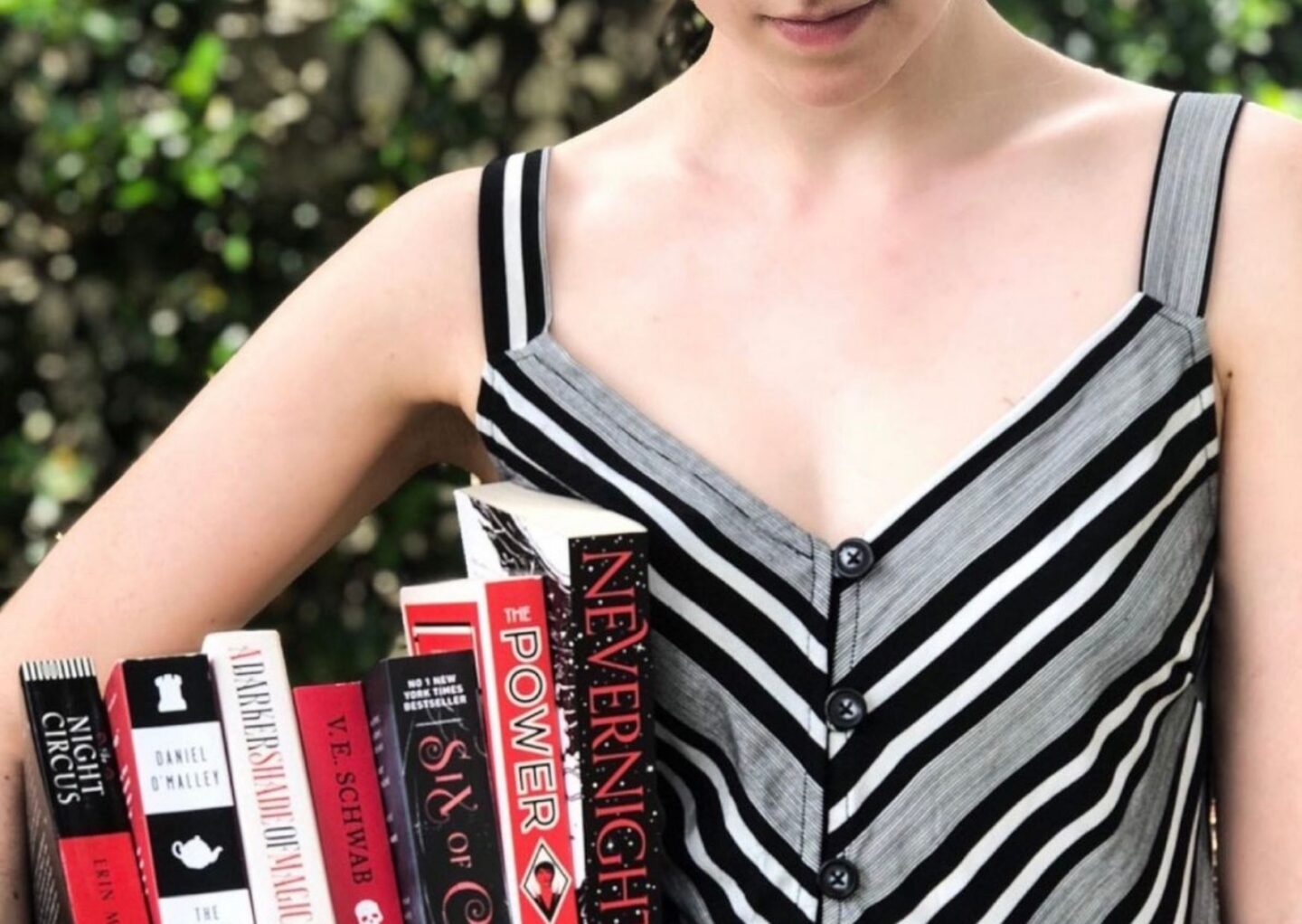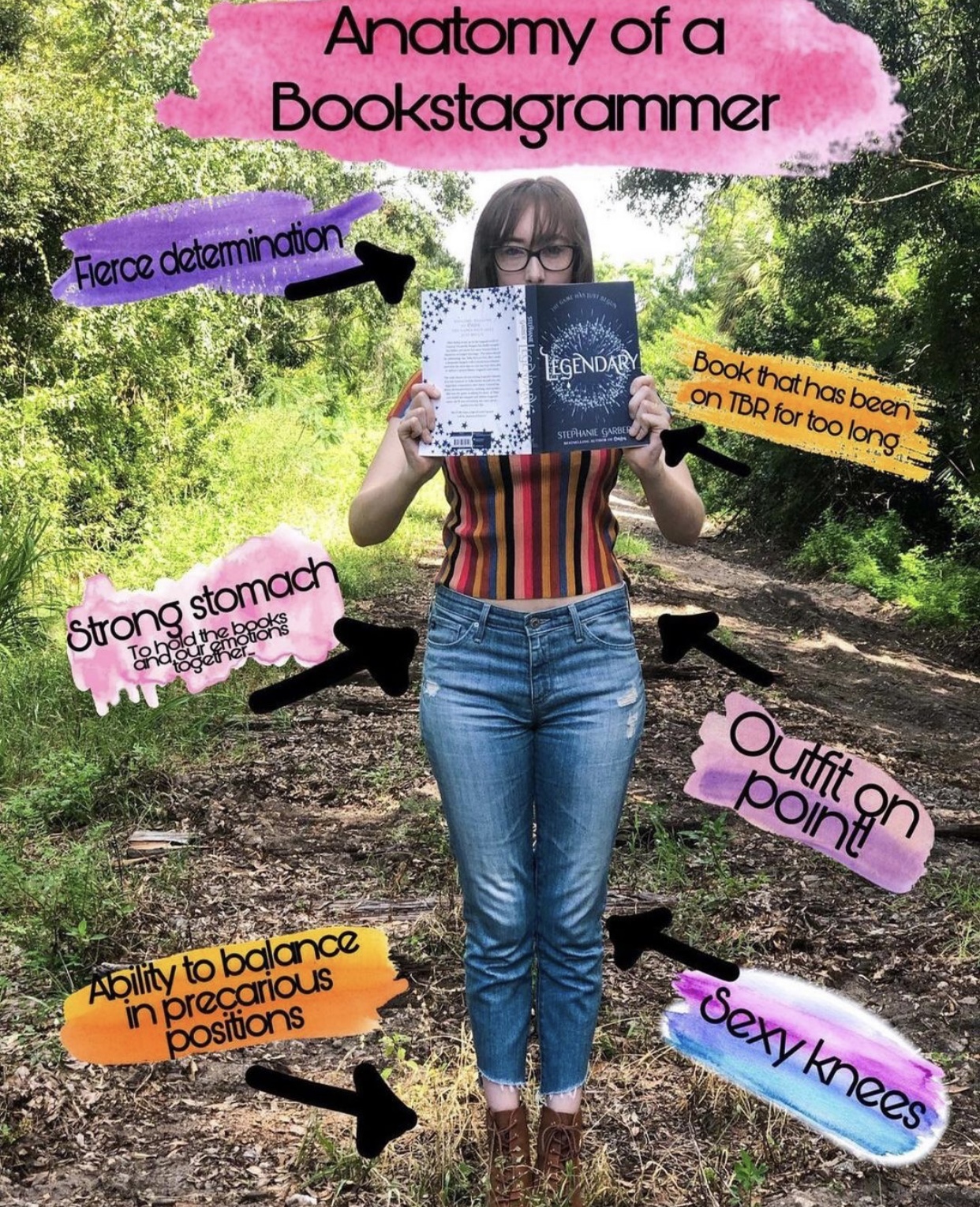
I have been on Bookstagram for 3 years now and I am still sometimes completely baffled by some of the lingo. I find myself pretending to understand all of the terms that I see being used on the GRAM, but honestly…I sometimes just have no idea what I’m talking about. I thought it was time to change this and went on a hunt to find the true meanings behind all the Bookstagram Lingo! Let me know if I miss anything!
Also, for more Bookstagram Tips you might be interested in: How to Rock Bookstagram and Save Money and How to Grow your Bookstagram.
General Bookstagram Lingo
Bookstagram:
A title that I am sure you are mostly familiar with, Bookstagram is the name given to the little corner of bookish Instagram. Used in a sentence: Bookstagram is my go-to place for finding bookish friends to interact with!
Reading Slump:
A phrase used to describe a period of time where a reader is unable to find a book that holds their attention. It can last for only a couple of days or even a few months! Used in a sentence: I experienced the worst reading slump of my life last year, it lasted a whole 7 months!!
Book Hangover:
A phrase used to describe a period of time after you finish an amazing book and you just don’t know what to do with yourself. You may also feel a sort of bewilderment as you return to the land of the living if you happened to binge read the book. Often times a book hangover may lead to a reading slump because you have difficulty finding a book that lives up to your latest read. Used in a sentence: I got a huge book hangover after finishing ACOTAR and Outlander!
Own Voices:
Stands for a book with an author that is writing about their own experiences and from their own perspective. Used in a sentence: My favorite Own Voices book is The Kiss Quotient, about a woman with Asperger’s learning to accept her own needs for finding love. Other Examples of Own Voices books: The Hate You Give, Felix Ever After, and They Both Die at the End.
Smut:
A phrase used to describe lots of sexy times in books. Used in a sentence: Sarah J Maas is the queen of writing Fae Smut. Examples: ACOTAR series, Chaos Motorcycle Series, and The Claiming of Sleeping Beauty.
Canon:
A Phrase used to describe what actually takes place within a series of books. Fan Fiction will use this as a starting point for changing the story lines of books around for added fun! Used in a sentence: The darkling deserved better in the canon material.
Cinnamon Roll:
A phrase used to depict a sweet and loveable character. Used in a sentence: I don’t care if Kylo Ren is a Sith, he is still my cute little cinnamon roll that I must protect! Examples (of actual cinnamon roll characters: Jem Carstairs, and Wylan Van Eck.
Smol:
A phrase used to describe a cinnamon role type character (see above) but also characters that are small in stature. Used in a sentence: Super curious if this means I can start referring to Sevro as an adorable little smol that I just want to hug and squeeze his cute little cheeks!
Simp:
Correct me if I am wrong but I have come to the conclusion that this is used to mostly describe readers who fall head over heals for a character. It is a term that describes a person who excessively obsesses over a person (or in this case character). I am not too familiar with the term but it seems to be somewhat derogatory so I probably will keep this one out of my pool of Bookstagram vocabulary.
Stan
A phrase used to describe a super fan who obsesses over a character, author or book. I believe it can be used as a noun or verb. Used in a sentence: I stan for Jay Kristoff! OR Jay Kristoff has thousands of stans who all want an ARC of Empire of the Vampire…
Book Boyfriend/Girlfriend:
A book character that you fall in love with. Used in a sentence: I personally have 1 Book Husband, Mr Darcy, and about 5 other book boyfriends.
Sapphic:
Technically not a “Bookstagram” term but it is a term that I have recently started to see around Bookstagram and I had to research it when I first saw it. Taken from the poet Sappho, the term “sapphic” is used to describe books with lesbian characters.
Bookstagram Lingo: Genres

Dark Academia:
A subgenre of books that take place in an academic setting and usually revolves around a murder. Examples: If We Were Villains, The Secret History, and Bunny.
New Adult:
A genre of books that caters to 18–30-year-olds. I read somewhere that it is “supposed” to be for 18–23-year old’s but I PERSONALLY feel like it’s really geared to any one in their twenties. (And is 100% fine for any age group to read). Examples: The ACOTAR series, Get a life Chloe Brown and The Kiss Quotient.
YA:
A genre of books referring to Young Adults, typically catering towards 13–19-year-olds. Used in a sentence: YA is NOT only for teens, and I will probably continue to read it until I’m 102. Examples: Hunger Games, Children of Blood and Fangirl
MG:
A genre of books referring to Middle Grade reading levels. This typically is suited for ages 8-12 and can be a great option when you are needing a light book to read. Examples: The Mysterious Benedict Society, Enola Holmes, and The Book Scavenger.
UF:
A genre of books referring to Urban Fantasy. Typically set during modern times but depicting a fantasy aspect where immortals, fairy’s, etc… roam the world. Examples: American Gods, Dark Fever and City of Bones.
HIFI:
An abbreviation for the genre Historical Fiction. Examples: Outlander, The Alice Network and Wolf Hall. Used in a sentence: I used to read Historical Fiction all the time but my HIFI reading has been slacking lately!
Contemporary
A genre used to describe realistic fiction, or fiction made in today’s time period. Used in a sentence: I am a huge fan of Contemporary Romance, but have recently started reading some YA Contemporary and really enjoy it!
Tropes:
A phrase used to describe a common literary device in fiction that is replicated often. Examples of some common tropes in books are as follows…
Love Triangle:
When there are 2 characters that are in love with the same third person and third person usually has some degree of feelings for both characters. The reader is left to wonder who the third person will eventually pick. Example: Twilight
Found Family:
When a group of characters do not have the greatest home life or family life and they create a family of their own through close friendships. Example: Six of Crows
Enemies to Lovers:
When two characters dislike each other in the beginning of the book and eventually grow to love each other. This is a personal favorite trope of mine! Example: Pride and Prejudice
The Reluctant Hero:
When a series of events causes a character to reluctantly step into the role of “hero”. Often times it depicts a character with special powers who does not want to use their powers, but eventually has to use them in order to save the community. Example: Spider Man
Damsel in Distress:
When a female character has an issue or problem that can only be resolved (usually) with the help of a male character. Essentially she is helpless. This is not a favorite trope of mine. Example: Again, Twilight.
Insta Love:
When a relationship in a book develops immediately, often times their is an element of “fate” mentioned. If done incorrectly this is one of my least favorite tropes, but I have to admit to liking “Fated love stories” where the characters are meant to be together. Example: Shiver
Harem and Reverse Harem:
Books with Harems depict a relationship between a group of people where there are multiple women and one man. Reverse Harem is exactly the opposite, with one women and a group of men. Examples: Harem book: Silver Angel and Reverse Harem: The Dark Side series.
Bookstagram Lingo: Abbreviations
TBR:
Abbreviation for the phrase “To Be Read”. Used in a sentence: My TBR pile has grown feelings of its own and has staged a coup to take me out the next time I buy more books before reading one that I already own.
CR:
Abbreviation for the phrase Current Read. Used in a sentence: My current read is Pride and Premeditation and I am absolutely loving it!
HEA:
Abbreviation for the phrase “Happily Ever After” usually referring to couples ending a book together and happy. Used in a sentence: I need all of my romance books to have a HEA otherwise I am seriously not happy!
SHIP:
Technically not an abbreviation but more of a shortened term for the word Relationship. It stands for the characters that you want to end up together, even if it doesn’t happen in the books or movies. Used in a sentence: I am a hardcore Darkling and Alina fan and I totes ship them together.
OTP:
Abbreviation for the phrase “One True Pairing”. It generally stands for the bookish couple that you believe belongs together more than any other bookish couple. Used in a sentence: Most people would think that Mr. Darcy and Elizabeth are my OTP but Mr. Darcy belongs to me!
NOTP:
Abbreviation for the phrase Not One True Pairing. It basically means a couple that you definitely do not want to end up together, or wish did not end up together. Used in a sentence: #Darklina is my top NOTP!!!
POV:
Abbreviation that stands for “Point of View”.
DNF:
Abbreviation that stands for “Did Not Finish”. Used in a sentence: I read 5 pages of Pride and Prejudice and Zombies before I promptly said NOPE, and DNF’d it! (I have sense watched the movie and actually liked it so I will be giving it another try)
MC:
Abbreviation to describe the Main character in the book. Used in a sentence: I like my MC to be witty and charismatic with just a touch of weird!
ARC:
Abbreviation that stands for “Advanced Reader Copy”. Used in a sentence: I have literally BECOME Jay Kristoff on Bookstagram and I still have not been given an ARC of Empire of the Vampire.
RTC:
Abbreviation that stands for “Review to Come”. Used in a sentence: I am loving this book and should finish it tomorrow, RTC!
NSFW:
Abbreviation that stands for “Not Safe for Work”. Typically meaning content that you might not want to open and read while at work. Used in a sentence: Kristen Ashley is my favorite NSFW author, her books are so SEXYYYYYY. Dream Man series is one of my faves!
WIP:
Abbreviation for the phrase Work In Progress and usually used by authors more so than readers on Bookstagram.
M/M:
Representing a book that portrays a relationship with male characters falling in love. Examples of books: Red White and Royal Blue and The Song of Achilles.

F/F:
Representing a book that portrays a relationship with female characters falling in love. Examples of books: Leah on the Offbeat and Written in the Stars.
Hah, now I can show my mom this post whenever I’m explaining something about Bookstagram 😂
Author
YES, EXACTLY!!!! HAHA